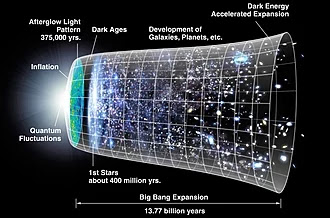Space Colonization Part-II
So here I'm again with the second part of space colonization. In the previous part we discussed what actually space colonization is, what are the reasons and how can it be accomplished. In case you missed it, checkout the first part Space Colonization Part-I. As I said in the earlier part about suitable locations let's start with some locations that are suitable for building colonies on different planets and moons that can support life after Earth.
- THE MOON
Earth's moon is always in discussions whether it will be a good decision to colonize moon or not. The major problems are low quantity of materials available on the moon. Materials essential for life are hydrogen, nitrogen and carbon. It is said that water-ice in some polar regions can help to extract these elements. Another solution is directly pointed towards asteroid mining. Asteroids can be helpful in extracting any material or element we need, asteroids near earth can be used to extract hydrogen and other elements. Another problem that arises is the gravity on moon, it is not known that humans can survive in 1/6 of gravitational force or not. Also moon has no atmosphere that can protect us from harmful radiations and meteors etc. The moon has nights and days each lasting two weeks which might be difficult for habitants also solar power is too discontinuous. These are the major drawbacks of why colonizing moon isn't a good idea.
A Space colony is expected to be a massively expensive project as it costs a total of 56 million dollars for a launch of 13,000 kgs. SpaceX is currently working on a re-usable launching system to re-use the rockets and other machinery. Currently SpaceX's rocket, Falcon 9 is the most cheapest in the world and when it becomes re-usable then there will be a major drop in the cost of production of a colony. Although it would require many billion dollars which can be only accomplished through funding, investing etc.. Many researches have stopped as they lack financial support. There are few companies which are ready to invest in the project as they know that it is essential for future generations. But these are not enough, many companies have declined investing in it as they see no profit and why would anyone spend money on something which is not profitable. These are the major drawbacks of Colonizing Space and why any other organizations other than SpaceX have no plans for it.
OBJECTIONS
There are many arguments and objections against space colonization by scientists. One of the basic argument is that the current technology does not support such projects. Colonizing space would require large amounts of Physical, Financial and Human investments for research, development and production. Many scientists believe that trying to build such colonies would be a wastage of materials and natural resources. Researchers believe that space colonization would be a backup for humans if everyone is being killed and with this objective it is sure that no one will be ready to invest money. Why would anyone invest money in something that would only be used after they're killed. It is said that space colonization is not a well acknowledged goal. Other arguments include risk of living in a space colony. Scientists believe that building a colony and living in it is a greater risk of lives than the destruction of Earth. Additional concerns include health of humans who may participate in a colonization project, including risks of physical, mental and emotional health risks.
At last, I would like to conclude that space colonization might have some major drawbacks and objections but it is the only way for humans to survive after the destruction of Earth. We should be very active towards it as the End is near.
Comment Your Views and Suggestions:)
- MARS
Mars is the main target for scientists to colonize and support human habitation. The atmosphere of mars is 96% of carbon dioxide with traces of oxygen. Presence of carbon dioxide is essential for humans as it helps in growing trees that can in turn provide oxygen for humans. Mars's surface conditions and presence of water makes it most stable planet in the solar system for life support after Earth. The days and nights are similar to Earth and gravitational force is also quite similar. The only problem is the high atmospheric pressure on the surface of Martian land. It is still unknown that whether humans could survive on mars without a space suit as they use for a space travel. Also whether we could be able to create a natural environment on mars or we have to survive on the artificial one. Researchers are working hard to find answers to many questions arising on the colonization of mars. From all the above factors it is sure that if in future we have to leave Earth then Mars would be the second home.
- ASTEROID BELT
- MOONS OF JUPITER
Jupiter has 79 known moons from which 3 are known to be habitable. Europa, Ganymede and Callisto are the moons which are said to have volatiles necessary for human habitation. Scientists even designed a project of colonizing these moons called the Artemis project. However these moons lie outside the habitable zone of the Solar System which ends near Mars. Colonizing these moons will be a very difficult task financially and also it will be a greater threat to life when compared to other planets. These moons receive a high radiation from the planet and hence are not suitable to live.
- BEYOND THE SOLAR SYSTEM
Beyond the Solar system there are billions of stars with the potential of supporting life. Scientists believe that there might be many replicas of our Earth which can support life even better, but we haven't found one yet. If we even find a planet similar to Earth then the main problem will be travelling as present technologies did not find a way to make an interstellar travel possible. Scientists also believe that on such a planet we are more likely to find aliens or humans just like us.
EXPERIMENTS AND RESEARCHES
There are many organizations presently working on colonizing space specially Mars. Many researches and experiments are being done in order to know whether or not humans will survive on space. SpaceX, one of the most popular organizations has set plans to land on Mars. Elon Musk, CEO of SpaceX, At the International Astronautical Congress said that his Ships might land on the planet Mars by 2022. Currently many tests are being done in order to safely land and execute their plans on Mars. He also said that Humans could land on Mars by 2024. They are now currently testing flights before placing anyone on board. By 2024 SpaceX plans to send two crew ships and two cargo ships to take people to Mars for the first time. Their mission is to set up production plants combining Martian water, ice and carbon dioxide which can be used to create methane and oxygen. It is said that these can be used to fuel their ships and come back home. By 2025, the earliest colony might take place on mars as said by SpaceX. SpaceX is ahead of all the organizations that are working on colonizing Space. Musk also said that he might also be visiting mars once in his lifetime. In one or two decades we are going to have established colonies on mars and within a century population on Mars will be greater than that on Earth.
EXPERIMENTS AND RESEARCHES
There are many organizations presently working on colonizing space specially Mars. Many researches and experiments are being done in order to know whether or not humans will survive on space. SpaceX, one of the most popular organizations has set plans to land on Mars. Elon Musk, CEO of SpaceX, At the International Astronautical Congress said that his Ships might land on the planet Mars by 2022. Currently many tests are being done in order to safely land and execute their plans on Mars. He also said that Humans could land on Mars by 2024. They are now currently testing flights before placing anyone on board. By 2024 SpaceX plans to send two crew ships and two cargo ships to take people to Mars for the first time. Their mission is to set up production plants combining Martian water, ice and carbon dioxide which can be used to create methane and oxygen. It is said that these can be used to fuel their ships and come back home. By 2025, the earliest colony might take place on mars as said by SpaceX. SpaceX is ahead of all the organizations that are working on colonizing Space. Musk also said that he might also be visiting mars once in his lifetime. In one or two decades we are going to have established colonies on mars and within a century population on Mars will be greater than that on Earth.
 |
| FALCON 9 |
A Space colony is expected to be a massively expensive project as it costs a total of 56 million dollars for a launch of 13,000 kgs. SpaceX is currently working on a re-usable launching system to re-use the rockets and other machinery. Currently SpaceX's rocket, Falcon 9 is the most cheapest in the world and when it becomes re-usable then there will be a major drop in the cost of production of a colony. Although it would require many billion dollars which can be only accomplished through funding, investing etc.. Many researches have stopped as they lack financial support. There are few companies which are ready to invest in the project as they know that it is essential for future generations. But these are not enough, many companies have declined investing in it as they see no profit and why would anyone spend money on something which is not profitable. These are the major drawbacks of Colonizing Space and why any other organizations other than SpaceX have no plans for it.
OBJECTIONS
There are many arguments and objections against space colonization by scientists. One of the basic argument is that the current technology does not support such projects. Colonizing space would require large amounts of Physical, Financial and Human investments for research, development and production. Many scientists believe that trying to build such colonies would be a wastage of materials and natural resources. Researchers believe that space colonization would be a backup for humans if everyone is being killed and with this objective it is sure that no one will be ready to invest money. Why would anyone invest money in something that would only be used after they're killed. It is said that space colonization is not a well acknowledged goal. Other arguments include risk of living in a space colony. Scientists believe that building a colony and living in it is a greater risk of lives than the destruction of Earth. Additional concerns include health of humans who may participate in a colonization project, including risks of physical, mental and emotional health risks.
At last, I would like to conclude that space colonization might have some major drawbacks and objections but it is the only way for humans to survive after the destruction of Earth. We should be very active towards it as the End is near.
Comment Your Views and Suggestions:)







“Nice info!”
ReplyDelete“Great share!”
“Useful post”
“Amazing write-up!”
BUT NEED MORE INFO IN THE THIRD PART
BEST OF LUCK FOR YOUR NEXT BLOG
😊😊😊
Thanks a lot! but sadly there's no third part :(
DeleteHEY JARVIS
ReplyDeleteYou are a genius. ...
Awesome
ReplyDeleteDon't stop, keep it uo.
ReplyDelete